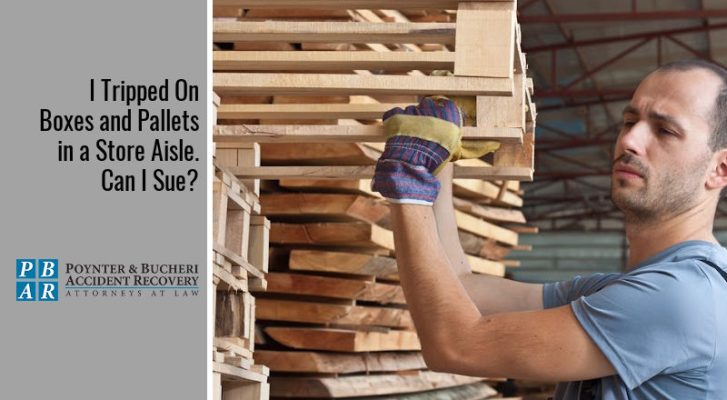
I Tripped On Boxes and Pallets in a Store Aisle. Can I Sue?

Until you have tripped over one, you probably never spent much (if any) time considering the pallet, a flat structure, usually used to stack, store, and transport goods. Most pallets are made of wood; when full, they are heavy, and approximately 400 million of them are produced in the U.S. each year.
Most people are aware of the hazards of a wet or slippery floor in grocery or retail stores. But a surprising 51% of store-related injuries annually happen because someone tripped over a pallet. A study published by the Journal of Safety Research last year noted that between 2014 and 2018, 30,493 people were treated in emergency rooms because of pallet-related injuries. The study showed that those ages 35-44 (5,481 injuries) were most likely to be injured in a pallet-related accident. Of these pallet-related injuries, 14% occurred in retail stores, and injuries to the lower extremities were the most common.
How do people trip over pallets or boxes in stores?
When empty (or even full) pallets or boxes are left in an aisle, they can cause tripping hazards in several ways:
- If they are stacked lower than eye level, it is very easy for them to be missed.
- They pose a tripping hazard if they are stacked unevenly so that a portion of the pile projects unexpectedly.
- They may also be stacked in such a tall tower that store customers are unable to see around them.
Since having unexpected piles of wooden pallets or boxes in the middle or end of a store aisle is so hazardous, you may wonder why they are ever even present. Store employees need to unpack goods onto shelves to keep them fully stocked. In the old days, this would usually have happened while the store was closed to customers. These days, many stores are open around the clock. Third-shift employees are difficult to hire, and staffing shortages are widespread. The store finds itself in a position where goods have to be unpacked and shelved while customers are present. In some cases, overworked employees juggle cashier duties with stocking duties, so they don’t get to complete their unpacking immediately.
Staff are supposed to be trained on safety measures, but sometimes those are forgotten or ignored. It is true that leaving empty obstructions around isn’t illegal, but it is unsafe.
OSHA standard 1910.22 states that floors and workspaces “must be free of … loose boards and any other potential dangers” and that “all aisles and passageways must be clear of any obstructions.” As the Houston Chronicle’s small business newsletter observes, “Businesses with empty pallets on the sales floor would be in direct violation of this safety standard.”
Can I sue after I’m injured?
Yes, if you have been injured by tripping over boxes or pallets in a store aisle, you can certainly sue. You will want to consult an attorney who is experienced in retail negligence accidents and the Indiana Premises Liability Law. Under this law, property owners are responsible if you are injured or suffer damages because of unsafe property conditions. The store must have known about the danger without taking steps to fix it. Since the boxes or pallets were presumably placed by a store employee, the store would have known about it.
To be considered under premises liability law, the following conditions must be true:
- The defendant (store owner) owes a duty to the plaintiff (you, the injured person): this is the responsibility to maintain a reasonably safe environment.
- The defendant breached this duty (did not maintain a reasonably safe environment).
- But for the defendant’s action (or failure to act), the plaintiff wouldn’t have suffered the injury. This means that you wouldn’t have been injured if it hadn’t been for the negligence of the store owner or store employees.
- The defendant’s action (or failure to act) was the proximate cause of the injury, and the defendant could have foreseen this. Proximate cause means “legal cause,” or one that the law recognizes as the primary cause of the injury.
- The plaintiff suffered damages (such as injury-causing medical bills and pain and suffering).
Call on the retail accident injury experts at Poynter & Bucheri
No store owner or store employee wants anyone to be injured on their watch. Clearly, what happened to you was an unfortunate accident. However, it was an accident caused by their negligence, and it is only fair that you are compensated for your economic and noneconomic damages.
The lawyers at Poynter & Bucheri will fight to make sure that you are fairly compensated for:
- Medical expenses, including rehab and medications
- Loss of current and future income.
- Pain and suffering
- Any other out-of-pocket expenses
For more details, please refer to our article on Retail Store Negligence.
The Statute of Limitations for Indiana personal injury lawsuits is two years. However, you will want your attorney to investigate the facts of the situation as quickly as possible. Poynter & Bucheri can help!
If you have been injured by tripping on boxes or pallets in a store aisle, contact the retail negligence accident experts at Poynter & Bucheri. Our fee is only 25% compared to the higher 40% rates with other attorneys. We will ensure you are appropriately compensated for your injuries and losses. Don’t hesitate — one of our experienced attorneys can assist you right away. Call 1-800-265-9881 for a free case review.
